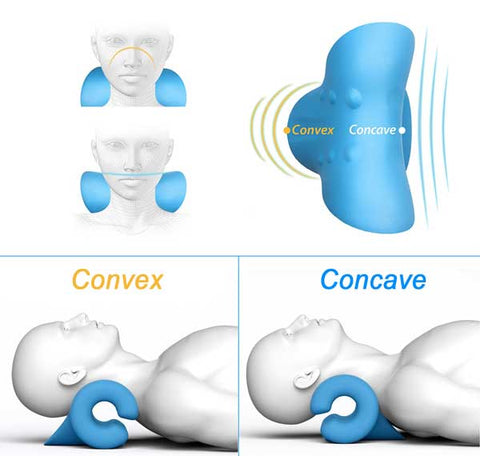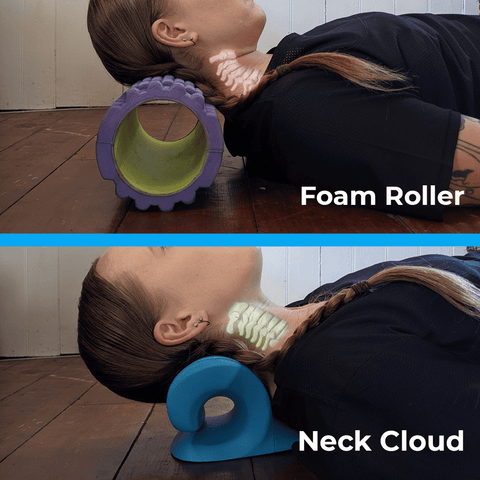Get Enduring Relief with the Neck Cloud: The Ultimate Neck Assistance
Get Enduring Relief with the Neck Cloud: The Ultimate Neck Assistance
Blog Article
The Effect of Tension on Neck Pain: Strategies for Lowering Stress and Pain
In today's fast-paced globe, it's no trick that tension has actually ended up being a prevalent variable in the start and exacerbation of neck discomfort. Join us on a journey to unwind the influence of stress on neck pain and uncover effective methods to alleviate discomfort and enhance general high quality of life.
Recognizing Stress-Related Neck Discomfort
Neck pain is a typical grievance that can usually be associated to stress and anxiety. Stress-related neck discomfort can manifest as stress, stiffness, or discomfort in the neck and shoulder location. The link in between tension and neck pain hinges on the body's physiological reaction to tension, which can cause muscle stress and tightness in the neck muscular tissues. Persistent stress and anxiety can lead to persistent neck pain and worsen status quo like cervical spondylosis or muscle stress.

Identifying Common Tension Areas
Frequently experienced by people under stress and anxiety, stress locations in the body can offer beneficial insights into the physical symptoms of mental pressure. One common stress area is the neck, where anxiety typically shows up literally. Stress headaches, stiff neck muscles, and restricted variety of motion prevail symptoms of stress-related neck stress. The shoulders are one more typical area where tension gathers. Stress can create the muscle mass in the shoulders to tighten up, bring about pain and discomfort. Furthermore, the upper back is prone to tension build-up, particularly in people that experience persistent stress and anxiety. Poor position and extended sitting can aggravate tension in this location. The jaw is likewise a common area for stress-related tension, as many individuals clench their jaw or grind their teeth when stressed. Recognizing these usual tension areas can help individuals recognize the physical signs of stress and anxiety and take steps to address them before they intensify right into persistent pain or discomfort.
Carrying Out Relaxation Strategies
Leisure strategies are useful tools for minimizing neck pain triggered by stress and anxiety. Additionally, activities like yoga and tai chi include both physical motion and relaxation, making them reliable methods for lowering stress and neck pain. By integrating these leisure strategies right into your daily routine, you can help manage tension levels, reduce stress in the neck, and reduce discomfort associated with stress-induced neck pain.
Integrating Self-Care Practices
Integrating self-care methods is vital for preserving general health and handling stress-related neck pain properly. Involving in routine find this exercise, such as gentle stretching exercises or yoga, can aid relieve stress in the neck and shoulders. Exercising great stance throughout the day and taking regular breaks from prolonged resting or screen time can also prevent strain on the neck muscular tissues.
Furthermore, prioritizing sufficient rest and establishing a consistent sleep regimen can contribute significantly to minimizing tension degrees and promoting leisure. Creating a calming going to bed routine, such as checking out a publication or taking a warm bathroom, can aid prepare the mind and body for relaxed sleep. In addition, maintaining a well balanced diet rich in nutrients and remaining moistened can support general wellness and reduce inflammation that may aggravate neck pain.
Integrating mindfulness techniques, such as deep breathing workouts or reflection, can help manage tension and advertise relaxation. Taking time for oneself, participating in hobbies, and setting limits to safeguard individual time are likewise crucial facets of self-care that can add to reducing tension and relieving neck read what he said discomfort.
Seeking Professional Aid
Exactly how can people successfully deal with persistent neck pain that is influencing their daily life and health? Seeking expert aid can be a critical action in managing and minimizing neck discomfort.
Chiropractic practitioners concentrate on back adjustment techniques to improve alignment and decrease tension in the neck area. Physical therapists offer targeted exercises and stretches to strengthen muscle mass, improve flexibility, and enhance general neck function. Orthopedic professionals can provide innovative clinical treatments such as injections or medical choices for severe situations of neck pain.
Verdict

Stress-related neck discomfort can manifest as stress, stiffness, or pain in the neck and shoulder location. The connection in between tension and neck find more info pain exists in the body's physical reaction to anxiety, which can result in muscle tension and rigidity in the neck muscle mass. Tension headaches, tight neck muscular tissues, and restricted range of movement are usual signs and symptoms of stress-related neck tension. By incorporating these relaxation strategies into your daily routine, you can aid handle anxiety levels, decrease stress in the neck, and relieve discomfort connected with stress-induced neck pain.

Report this page